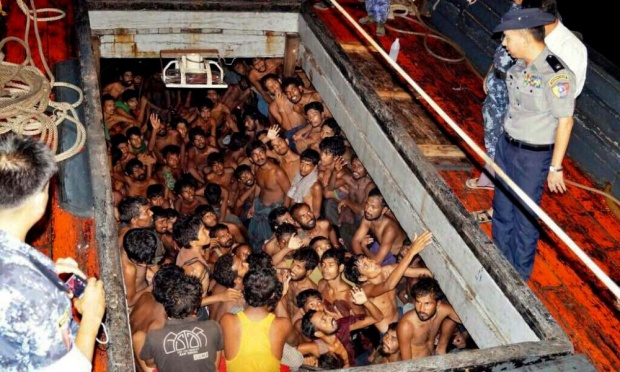Fate of the Rohingya Remains Uncertain
By Burma Partnership • May 25, 2015 The UN High Commissioner for Refugees has stated there are still thousands of Rohingya and Bangladeshi refugees stranded at sea, half of whom have been confined to their boats for more than a month. Many of the refugees are facing severe food and water shortages, and rescuers from Malaysia, Thailand and Indonesia – including Sumatran fishermen who have taken it upon themselves to rescue refugees – have reported that a number of boat people are in grave condition. Meanwhile, on 24 May 2015, another mass grave containing hundreds of refugees was unearthed near one of the recently uncovered human trafficking camps in Malaysia. A number of the victims were found to be from Burma, demonstrating the desperation faced by thousands of refugees wishing to emigrate from the oppression faced back home.
The UN High Commissioner for Refugees has stated there are still thousands of Rohingya and Bangladeshi refugees stranded at sea, half of whom have been confined to their boats for more than a month. Many of the refugees are facing severe food and water shortages, and rescuers from Malaysia, Thailand and Indonesia – including Sumatran fishermen who have taken it upon themselves to rescue refugees – have reported that a number of boat people are in grave condition. Meanwhile, on 24 May 2015, another mass grave containing hundreds of refugees was unearthed near one of the recently uncovered human trafficking camps in Malaysia. A number of the victims were found to be from Burma, demonstrating the desperation faced by thousands of refugees wishing to emigrate from the oppression faced back home.
Burma’s discriminatory treatment of the Rohingya continues to fuel the refugee crisis in the Andaman Sea. Over the past weekend, President Thein Sein approved the Population Control Health Care Bill, which enshrines into law the authority for state governments to determine birth-spacing guidelines in regions that are deemed to be facing high population growth, thus potentially acting as a tool for religious and ethnic discrimination. This repressive and discriminatory bill, a component of the controversial Race & Religion Protec tion Laws, has been supported by an influential group of ultra-nationalist Buddhist monks, such as the notorious Wirathu. The group has long spearheaded the hate campaign against Burmese Muslims of which many analysts claim is politically motivated by elements within the state apparatus.
The Burma Government’s rescue of 200 refugees has been significantly undermined by its unwillingness to accept responsibility for the humanitarian crisis or even allow the use of the term “Rohingya” during the upcoming regional talks in Thailand on 29 May. Unless the Burma Government puts an end to its hateful and discriminatory policies, life in the country will hardly be improved for returned refugees, and neither will it stem the continuous exodus of refugees from Arakan State.
UN Secretary General Ban Ki-Moon has urged the international community to commit to solving the immediate crisis, stating that humanitarian efforts to rescue the stranded refugees should be a “top priority.” This includes providing direct support to search-and-rescue operations, along with encouraging neighboring nations to comply with the customary international law principle of non-refoulement. The response to the refugee crisis, however, has been mixed at best. Malaysia and Indonesia have announced that they would provide shelter to the 7,000 refugees, however they have also indicated that this is only a temporary solution that would require long-term support from the international community. Thailand has stated that they will not receive refugees, but will agree not to push away landed refugees. Conversely, Australian Prime Minister Tony Abbott has stated that Australia will not receive Burma refugees in the future, believing that this will only increase the risk of human trafficking in the region. In fact, the only countries currently in support of a long-term plan of repatriation, resettlement, or financial aid are the United States, the Philippines, and The Gambia. Unfortunately even those that have declared support have not established the specifics of the long-term solution, including precisely how many Rohingya will be resettled or the extent of their financial commitment to the crisis.
While the international community seeks to protect the lives of those currently at risk in the Andaman Sea, a lasting solution must address the root causes of this crisis. As the ASEAN Parliamentarians for Human Rights suggests, “A comprehensive solution must do more than temporarily address the needs of a mere 7,000 refugees. It must include a regional plan of action to push the [Burma] government to end its systematic persecution of over 1.3 million people.” In addition, 37 civil society organizations have joined together in calling on Ban Ki-Moon to give “personal attention” to the crisis in Arakan State and to ensure that aid can be effectively delivered there.
The current refugee crisis is a direct result of the harsh, discriminatory policies of the Burma Government against the Rohingya people. Laws such as the Population Control Health Care Bill must be revoked and the civil and political rights of Muslim minorities, in particular the Rohingya, respected and protected. The international community is urged to support the fair treatment of the Rohingya by pressuring the Burma Government to comply with international human rights laws and standards, and to recognize their fundamental human rights. Inaction will only prolong an already dire humanitarian crisis, and the international community will have more and more blood on its hands.
Tags: ASEAN, Human Trafficking, Population Control Healthcare Bill, Refugee, Rohingya, Trafficking, UN Secretary-General Ban Ki-moonThis post is in: Blog
Related PostsBurma Partnership Celebrates Continuing Regional Solidarity for Burma and Embraces the Work Ahead for Progressive Voice
Myanmar’s New Dawn :Opportunities for Aung San Suu Kyi and U.S.-Myanmar Relations
Expanding People’ Solidarity for a Just and Inclusive ASEAN Community
Civil society launches #FreeThe5KH campaign in support of the imprisoned ADHOC staff and NEC official
Myanmar logging ban a major step to forest sector reform









 All posts
All posts